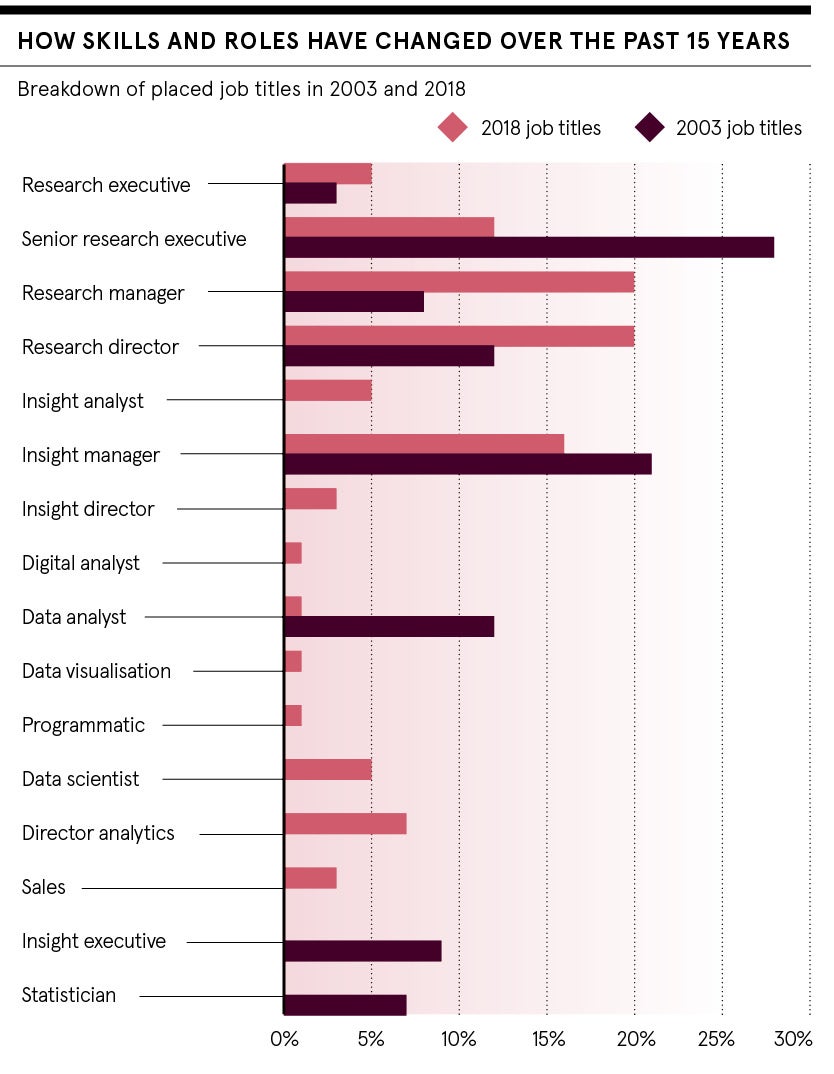Even 20 years ago, the terms big data and data science weren’t used. The insight industry consisted of market researchers and statisticians, who supplied data to people with the time and skills to process them.
Fast forward to 2019: time is scarce and requisite skills have diversified so much that companies now need answers, stories and recommendations to make sense of the data deluge they’re subjected to.
“The data used to be small so insight could report everything that is interesting. Now data is big and we need to curate it down to a manageable size,” says Elizabeth Norman, quoting her industry peer Ray Poynter, following a recent discussion.
Ms Norman, via her insight industry recruitment specialist company Elizabeth Norman International (ENI), recently evaluated the paradigm shift that has occurred in this realm over the past 30 years. The sector is now not only data centric, but also more international than ever before, she emphasises.
I can’t imagine an industry that could change more than this one has
“We recently tracked down 46 traditional researchers that we’d placed in UK roles back in 2003,” she says. “Of those 46, 12 are now working as insight specialists outside the UK and ten are in pure data science and analytics roles.
“The job titles they now have, which include social media strategist, head of customer experience, user researcher and marketing effectiveness manager, shows the shift towards a much greater range of techniques and skills as the industry grows and diversifies.
“The career opportunities this growth has given them is also clear; five of them are managing directors, another five are global heads of insight for large, blue-chip organisations.
“Just from our own stats and the achievements of the people we placed 16 years ago, you can see how much the industry has evolved.”
ENI is widely recognised as the leading specialist in global insight recruitment, matching companies and candidates to help negotiate such a fast-moving domain.
“I can’t imagine an industry that could change more than this one has,” Ms Norman continues. “It’s not just an industry evolution; it’s created a huge rise and diversification in career opportunities.
“Once there was just traditional qualitative and quantitative research, with a bit of data added on. Now the range of techniques companies use include artificial intelligence (AI), advanced analytics, mobile data, passive data, ethnography, video, social media analytics, biometric response, gamification, neuroscience and behavioural economics.
“In terms of job roles, this equates to needing specialists in areas that include data science, semiotics, psychology, video, graphic design, sales, AI, marketing intelligence, computer programming, communications and, for story-telling, even writing and journalism.”
For ENI as a company, the diversification of data application and usage has been a challenge. Data has no jurisdiction and as a consequence, ENI has worked with almost every sector of profit and even non-profit organisations, finding insight professionals to leverage vast swathes of data.
“All the companies we work with have masses of data coming in and need to make sense of it,” says Ms Norman. “They all need people to help them with it and that’s why our range of clients is so wide.
“ENI has been operational for 30 years, but the diversity of skills companies need and the resultant opportunities that have opened up for potential candidates, means we’ve had to massively widen our scope and understanding. It’s not just a search for the best researchers and statisticians anymore.”
Ms Norman is hugely proud of ENI’s ability to keep ahead of this curve, but even more so of the industry itself and the individuals the company has placed in insight roles over the years.
She concludes: “Of the 46 people we tracked down from 2003, three of them are actually still with the same organisations we placed them with initially and one has even risen from a junior role to now be head of intelligence and data analytics at Microsoft.
“I love to see that ongoing, long involvement with the industry to see how they, we and the industry has managed to keep ahead of the biggest paradigm shift it’s ever faced.”
For more information please visit elizabethnorman.com

